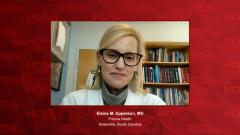
Referral for Type 1 Diabetes Screening in Pediatric Patients
Dr Elaine M. Apperson provides insight on when to refer patients with type 1 diabetes to pediatric endocrinology and comments on offering sibling antibody screening.
Episodes in this series

Elaine M. Apperson, MD: We discussed a little earlier about stages of developing type 1 diabetes, and we talked about how the immune system can start attacking beta cells, which are so necessary for glucose control. Generally, when a patient presents with full-blown diabetes they are referred to a pediatric endocrinologist. We know the sibling risk is about 5%. At a pediatric endocrinology visit where the child is being treated, at that point, the sibling or siblings of that patient are offered antibody screening. The reason is that we are working in research settings on trying to find some interventions that could thwart or postpone the onset of type 1 diabetes in patients before they develop it. We don’t have the 1-shot preventive treatment now, but we certainly are working toward possibly a few different interventions that could be used simultaneously to delay or even negate the onset of type 1 diabetes in patients who have not been diagnosed by working on immune system interventions.
We offer that screening in the pediatric endocrinology office to siblings, and if one of the siblings shows that they have 2 or more antibodies, they are eligible potentially for some of the trials we run across the country. Here in our office, we have just concluded 1 trial that we use for siblings. Additional trials are at different centers and are made available to families who wish to participate. It’s an ongoing process and a labor of love because it takes years to collect the data and figure out whether we’re making any impact at all. We definitely appreciate when our patient’s siblings choose to participate and parents choose to make the effort to help us do that work.
Transcript Edited for Clarity
Newsletter
Access practical, evidence-based guidance to support better care for our youngest patients. Join our email list for the latest clinical updates.





